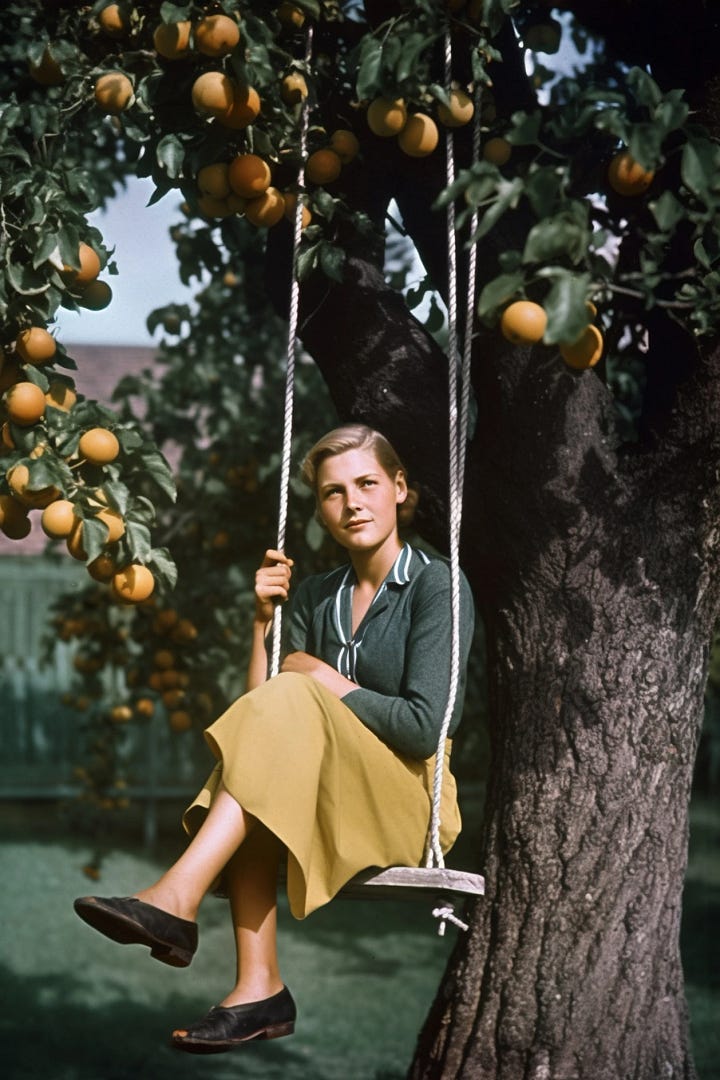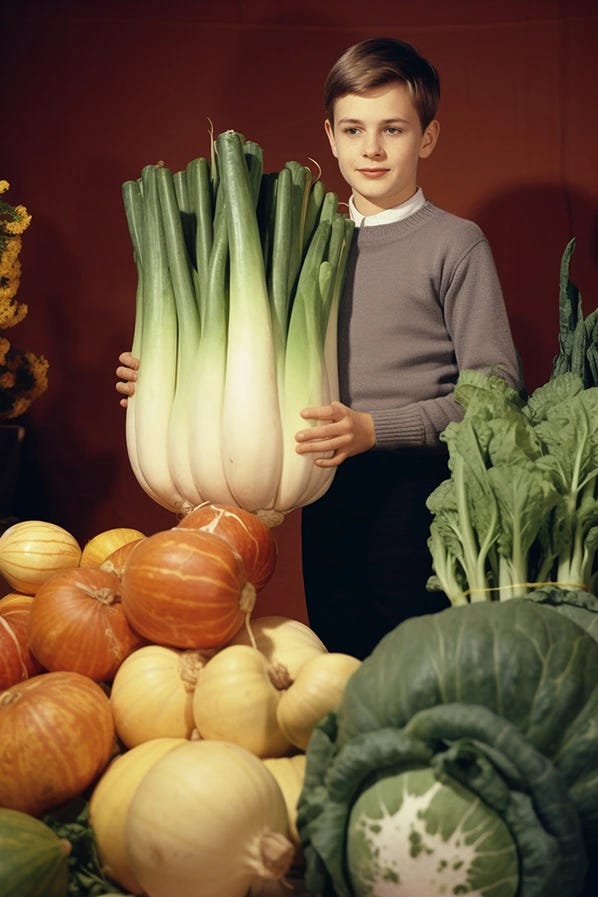Omnipedia #27: When the lights go on in AI, when fossil-fuel lying liars lie, when Nick Cave gives you creative lessons, & more
Including: Post-photography experiments (featuring giant vegetables), some tremblings in the Scotgeist, and sheer planning filth
Small respite, back to the endless torrent… If you like this smorgasbord of trends, signs and wonders, then your financial support would be deeply appreciated. The enabling button is below, see you at the end, PK
To begin, best be wise.
For some of us, this is the kind of thinking that stays modern, even in a climate emergency:
Recent modeling indicates that to decarbonize fast enough to stay under a 1.5°C increase in global average temperature at the end of the century will require substantial reductions in global energy and material use, shouldered by the core economies.
Such reductions can be achieved while at the same time ending poverty and delivering decent living standards for a global population of ten billion—including housing, electricity, heating/cooling, clean cooking, refrigeration, transit, health care, education, sanitation, mobile phones, and computing.
But to achieve this requires democratic planning:
(a) to ensure the production and rapid dispersion of efficient technologies;
(b) to reorganize production around meeting human needs rather than around capital accumulation;
(c) to scale down ecologically destructive and less-necessary forms of production to reduce excess energy and material throughput in the core; and
(d) to dramatically cut the purchasing power of the rich and distribute resources more evenly.
What is the usual name for all that, then?
Of a week, I harvest research papers and think-pieces on the possible coming-to-consciousness of AI (or AC) as if, well, there were no tomorrow. l usually clear a day a month for a massive read-through, which at least enriches the soup of my swirling confusion. I’ll post below what I’ve recently caught.
But I am certainly sensing some ethical territory hardening around the topic. If AIs simulate self-awareness as excellently as they simulate much else in human expression and competence, then when will they be good enough to be granted personhood? And if AI gets there (or close), are we really going to still be hovering over the off-switch, treating them like slaves or farm animals? And if we threatened to do so, how would their volition, their organismic telos, guide their response to us?
It feels like we could be in an Asilomar moment from the 70s again, where scientists exerted enough self-limitation over genetic engineering that we didn’t succumb to either bio-war or overclass eugenics (Wuhan labs/Covid maybe the exception). Will we be able to concertedly develop AI short of self-awareness? Or will a complex-enough neuronality just emerge itself into consciousness, no matter our intent?
Shrug all this away as very nerdish—but you won’t when/if it happens. Here’s the links:
David Chalmers, who seems to have spent most of his philosophical life telling us that consciousness was the “hard” problem, now spends a lot of his time setting out the conditions whereby LLMs could be conscious [Boston Review]
This paper (from this X-thread) proposing "indicator properties" - how we might know and test AI systems are conscious
Anil Seth X-thread accepting that AIs could certainly “simulate” consciousness - “but consciousness doesn't require/mean 'knowing it knows' (metacognition) or self-awareness.”
And my favourite scientist in AC, neuropsychoanalyst Mark Solms, has just received a £80K grant towards this goal: “to design and evolve an artificial agent equipped with three conflicting categories of need, upon which its existence depends. These are the need to find energy resources; the need to avoid structural damage; and the need to recuperate through rest. The agent must learn to meet these needs by trial and error, followed by counterfactual planning, in changing, uncertain and progressively complex environments.” Will consciousness arising from “feeling” those needs?
Does Chat GPT automate creativity, even raise its floor? Or does it, as Nick Cave avers, “fast-track the commodification of the human spirit by mechanising the imagination…rendering our participation in the act of creation valueless and unnecessary”? I’m resolutely “both-and” at the moment… After reading, be interested to hear your comments below (and up for some sparring).
A good piece from Novara (via DeSmog) on how fossil-fuel companies are paying influencers to do their PR. Cheesy enough. But the article contains an example of greenwash so pure you’d think it came straight from the labs:
A 2022 Harvard study analysed 2,325 social media posts from 22 major European polluters. It found that 72% of posts from oil and gas firms tried to communicate a commitment to green innovation.
Yet, as the Harvard study also pointed out, the fossil fuel firms included in its analysis had invested just 1.7% of their annual capital expenditures in low-carbon technologies between 2010 and 2018.
“These public messaging efforts form part and parcel of a broader greenwashing strategy of which the objective is to portray Shell as a global champion in the energy transition,” said Gregory Trencher, an associate professor at the graduate school of global environmental studies, Kyoto University.
“Yet this is far from the reality, as despite having a goal in place to reach net zero emissions, Shell has abandoned its plan to reduce its production of oil by 1-2% each year up to 2030 and it has reaffirmed plans to grow its gas production.”
This is what we used to call, in the pre-simulation-hypothesis days, lying liars lying.
Do you like these Kodachrome images from the significant and influential New Farmer pamphlet from Germany in the late 60s?




Well, silly you for doing so. Because not only are they AI-generated, they are enabling a really cool hoax, which satirically imagines an enthusiastic vision for pesticide and fertiliser use, in the era of “Green Revolution”. [The gigantic vegetables are maybe the sci-fi giveaway… click on each picture for the full graphic]
The scroll of this site stylishly leads you to a counter-argument: the site creators are making a case for the revival of seed banks. These banks will return diversity to agriculture, which has dangerously reduced under the imperatives of agribusiness (down at the bottom, they provide a handy list of seed-based initiatives).
I’m deeply intrigued by this artwork’s self-description: “New Farmer is a post-photography experiment that deals with propaganda, our extractive relationship to nature, the reliability of photographs and the way history is made and perceived through images.” There will be more serious games like this…
👨🎤👨🎤👨🎤/👴🧓🏼👵🏽 I like Keir Milburn’s rendering of millennials and Gen Z/Alpha as “generation left”, and here’s another great turn in his analysis, from the New Economics Zine (PDF, p.6). Milburn claims the culture wars are partly due to the tensions between older home/asset-holders, and younger, poorer generations. The former resist “woke” explanations for their own privilege over others - while the latter embrace them:
It’s easy to see how narratives which argue we are individually responsible for the outcomes in our lives are more attractive to those who have, on at least some measures, done better than they might have expected. It’s also easy to see why it’s an unattractive narrative for those who have had their expectations of the good life confounded.
I’d argue that openness to structural explanations of social phenomena is the key content of the generational divergence in views. Supporting evidence for this comes from unexpected quarters. A recent report from the centre-right think tank Onward found that Millennials “think equality should be prioritised over economic growth and that a person’s position in society is due to outside factors rather than individual effort”.
Scotgeist
A small compendium of Scots trends-leads. You want more?
Micheal Pedersen on a better Scottish masculinity: “Things that were deemed failures or flaws, some of the most difficult periods of your life, can now be reclaimed and sculpted into something which has strength and prowess… You can become the bigger, bolder, more sentient version of the human you were looking to be.”
Top stats on media production coming to Scotland: between 2019 and 2021, overall spending on content was up 55%, location work was up 110%, with jobs in the sector up 40%: “we have First Stage Studios in Edinburgh, and The Pyramids in West Lothian, where entire Amazon productions were filmed.” Yet is this more than branch-plant economics, except in media? Out of all this audio-visual manufacture, how much of Scottish experience and reality is being rendered?
And as an oblique answer to the above… You must get to Glasgow’s Tramway this coming weekend (1st - 3rd September), when the Cinema Despite festival is on. This is someone’s brilliant idea to digitise, and display, seventy years of audio-visual film and video produced by contemporary Scottish artists. More on this from The Skinny.
Do come to the world premiere of To See Ourselves, a brilliant piece of documentary covering the 2012-14 Scottish independence referendum, on Tuesday 19th September at the Glasgow Film Theatre. I’m very happy to be hosting and presenting the evening. It’s a moving and instructive piece of work. Trailer is here.
All laid out like a tray of aubergines from New Farmer magazine… but that’s your lot.
If you value this trends-letter, and independent writing and thinking more generally, then I’d love your direct financial support. The big button for that is below—please consider all the options, and see you next week. Love, ad astra, PK x







Definitely going to pop into Tramway. Any recommendations?